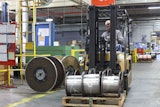Chem.Info's recurring Processing in Person feature highlights a processing company that stands about above the rest for the implementation of strategic processing techniques and the production of high quality goods. This week, we're focusing on Daniele, Inc., a deli meat processing company in Pascoag, R.I.
Food safety first
“We have a very extensive and aggressive food safety program,” says DeCesare. The company contracts with an outside laboratory to work on site. The laboratory is set up in a trailer outside and accessible to Daniele’s three facilities. The lab tests samples from each batch produced at the facility for salmonella and listeria, and Daniele holds lots for shipment until clean samples are returned.
In addition to strict testing controls, Daniele Foods performs comprehensive environmental testing in each of its three facilities, monitoring the facilities for the presence of pathogens. As a part of this program, points throughout the facilities are randomly selected, swabbed and tested for the presence of listeria.
In 2012 the company invested in a high pressure processing (HPP) machine for its high production salami processing facility. DeCesare calls HPP “one of the most sophisticated ways to help reduce the chances of contamination on finished product.”
The machine acts by applying pressure to finished, packaged goods. After processing and packaging, food products are loaded into small chambers which are then submerged within the HPP machine and pressurized. The pressure kills any pathogens that may be within the package without changing the nature of the product the way typical heat pasteurization might.
Daniele looks at this technology as a final checkpoint in what is a very safe process. “We make a product,” says DeCesare, “that employs multiple hurdle technology, which means there are many layers that go into making salami — or any of our dry-cured items — that, when stacked upon one another, make it very difficult for pathogens to overcome and survive.
“Of course,” he continues, “you still have to work in a safe and clean environment.” The company has a variety of food safety controls established throughout the facility in a food safety program that includes things like an antimicrobial foot bath at the entry point for workers, a comprehensive food safety training program and a color-coded safety system meant to identify which workers are meant to be present in different parts of the facility in an effort to prevent cross contamination throughout the various stages of the process.
“Stefano, the company’s president, is always pushing us to be better,” says DeCesare. “’How can we be better than everybody else and make our product better and safer for the consumer?’ HPP is a technology that is the best that there can be outside of irradiation to ensure that your product is protected against outside contamination.”
DeCesare says that the addition of HPP to the facility has added to the overall quality of Daniele Foods’ products, not just through the food safety assurance it provides, but because of the extended shelf life that has been delivered through the HPP process. “On some products, it can triple the shelf life,” says DeCesare, a realization that has had broad-reaching implications for both shelf life and safety, but also for distribution and storage.
“We try to be on the cutting edge of science and safety,” says DeCesare.
Yesterday… Where it all began
Tomorrow… The curing process























